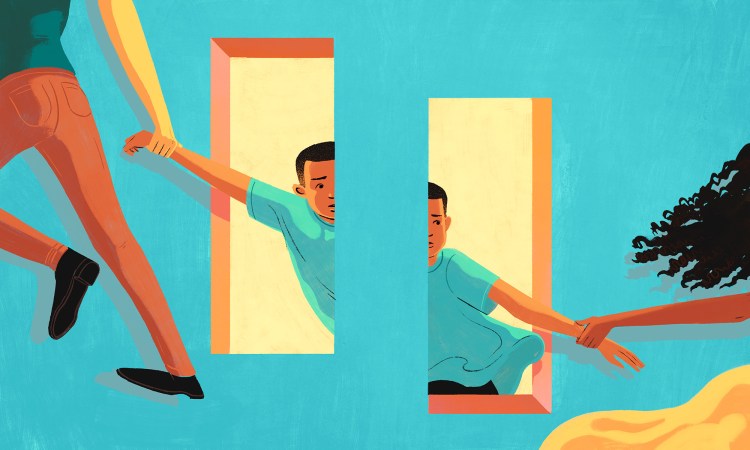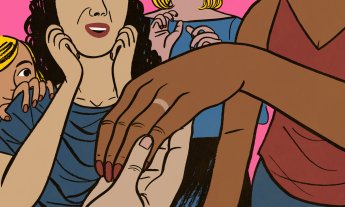
Most kids will suffer for a short time after a marriage ends, but what exacerbates and extends their stress and anxiety is when they feel torn between two parents, says communication researcher Tamara Afifi.
Fifteen years ago, I was doing field research for one of my first studies on divorce (TEDxUCSB Talk: The impact of divorce on children) and I experienced a moment that had a huge impact on me. I was going into families’ homes and spending four to seven hours interviewing them. In one house, I sat down with a 12-year-old boy and asked him about his parents’ divorce. He was having difficulty concentrating at school, he told me, and his stomach often hurt. When he said his parents fought a lot, I asked him if he talked to them about it. “No,” he answered. “Because if I bring it up, it makes the fighting worse.”
Parents don’t always know what their kids are thinking because, like this boy, they keep their feelings to themselves. As a result, they go around believing everything’s OK with their child when it’s not. Kids may suppress their emotions for a number of reasons — they don’t want to make their parents upset, they don’t know how to express themselves, or they’re simply too absorbed with their grief. After I talked to that boy, I thought, “I have to do something different to show parents how their fighting is affecting their kids’ bodies.”
Because divorce is so prevalent, many people think it doesn’t affect children that much. We’ve come to view divorce as a normal part of life, and that is true — 40 percent to 50 percent of marriages end in divorce in the US, for example. But just because divorce occurs frequently, that doesn’t mean a child won’t feel anxious or sad or angry. We need to recognize that divorce is stressful for children.
Children differ in terms of how they’ll respond to divorce. For most kids, it has a short-term impact that seems to last for roughly a year or so. During that time, they’ll suffer from lower self-esteem, increased anxiety and depression, less quality contact with their parents and a decreased standard of living. In some cases, though, the effects may linger. As adults, the children will continue to have psychological difficulties. They’ll have less satisfying relationships with their parents later in life, and they’ll be more likely to get divorced themselves.
One variable overwhelmingly determines how divorced kids will do. The most profound finding in my field in the past four decades has been the discovery of the most important factor in predicting how children will fare: parental conflict, and in particular, when adult fighting causes a child to feel torn between their parents. When a child experiences conflict, it creates anxiety and a cognitive dissonance in them, often causing them to align with one parent over another to ease their discomfort. As a result, their relationship with the other parent diminishes. It’s not the child’s fault — it’s their reaction to feeling caught — but that bond with the other parent may be difficult to re-establish. And conflict’s negative effects transcend those of divorce. In fact, the children whose parents stay married but who exhibit a lot of conflict have the most difficulty psychologically as well the most difficulty in establishing satisfying relationships later in life.
How do we know this? It’s in their spit. After meeting that boy, I started to do research on children’s physiological reactions, like their heart rates and galvanic skin responses, to their parents’ communication. But I became dissatisfied because it was unclear what emotion we were measuring. For example, a person might exhibit a change in their galvanic skin response because they were anxious or joyful or excited. I decided to focus on the hormone cortisol, which the body secretes when we’re under stress. In one study, we brought parents and adolescents from non-divorced and divorced families into 0ur lab. We’d sit one parent and one child on a couch and ask them to talk about stressful aspects of the parents’ relationship. We’d take a sample of the child’s saliva before the interaction and three times afterwards (right after, 15 minutes later, 45 minutes later) to see how their body responded to discussing family stress.
For children of divorce who felt caught between their parents, their cortisol would be elevated after their conversation. But if their parent supported them emotionally and comforted them, their cortisol levels would show a pretty steep decline within 30 to 45 minutes. After their interaction, the kid’s stress level was like a super ball bouncing around a room, and they’d still be revved up 45 minutes later. Keep in mind that we were measuring just one interaction between a parent and child. So if the parents were always fighting, imagine what that does to a kid’s body and how it might affect their stress and anxiety long-term. While our study sample was biased — the people who participate in such studies are likely to be better communicators than people who don’t participate — I do think our study can offer a conservative estimate of what happens in people’s lives.
Even seemingly benign interactions can cause children to feel torn. For example, Dad might say, “Can you remind your mother that you have a dentist appointment on Tuesday?” The child passes along the message. Mom responds, “Why didn’t your father tell me that? Why doesn’t he ever talk to me? You tell him he needs to talk to me more.” The result: the child feels caught between them. Less benign are the inappropriate disclosures, when a parent tells a kid something about the other parent that they should be sharing with a friend. This seems to happen more often today because children are emotionally closer to their parents than they were decades ago. These disclosures can also lead to a kid feeling torn.
Children exhibit three major responses to conflict. One way is by avoiding their emotions. Kids can do this out of good intentions — they don’t want their parents to feel sad or guilty — but it means the parents never know their child’s true feelings. Another way kids respond is by being aggressive. They mimic the conflict they’ve been witnessing and lash out at their parents and at other people. They might not even know why they’re so angry. A third response is for kids to confront their parents. This is the most effective way for children to deal with conflict: to tell their parents that they feel caught and to ask them to speak to each other. Since most children have been raised not to talk back, this response tends to come only with age and maturity. As children reach their teens, they increase their competence and gain the ability to speak openly to their parents.
What can parents do? First, explain and then listen. Parents need to recognize they may be on a different timetable when it comes to healing from divorce than their children are. Often a parent has been grieving the end of their marriage for many months or years, but the child has not. So they may need more time to mourn and to accept what’s happening. Parents should also give their kids enough information about the divorce to reduce their uncertainty about why it happened and what will happen in the future. This doesn’t mean they have to sit down and have a long conversation. Research has shown that discussion can flow more easily when parents and kids discuss serious subjects, such as divorce or death, while engaging in an activity, like taking a walk together or making dinner. If your child is young, you can play Legos with them on the floor and talk. My daughters used to tell me everything about their days while I was washing their hair in the bathtub.
Second, strive to be civil. You should try to maintain as amiable a relationship with the other parent as possible. (The exceptions to this are if they were abusive or neglectful of the child; in those cases, the child needs to know that behavior is not OK.) Even if the other parent speaks in a derogatory way about you, do not engage. If you refuse to fight back, they’ll probably get bored.
Third, maintain a good support system. People’s social networks can decline after divorce because couples may have mutual friends who drift away rather than take sides. As a divorced parent, you should have friends or family members with whom you can share your feelings instead of turning your child into your confidante. Encourage your kid to seek their own sources of support. Some schools, religious institutions, or community organizations provide support groups for children of divorced parents. It’s important for them to have a friend they confide in, especially someone who’s been through a divorce.
Finally, ease up on yourself. It’s okay to be vulnerable at times. Children need to know their parents are human, too. In the end, what’s most important is for them to know they are loved by you and that you’ll always be there for them.











